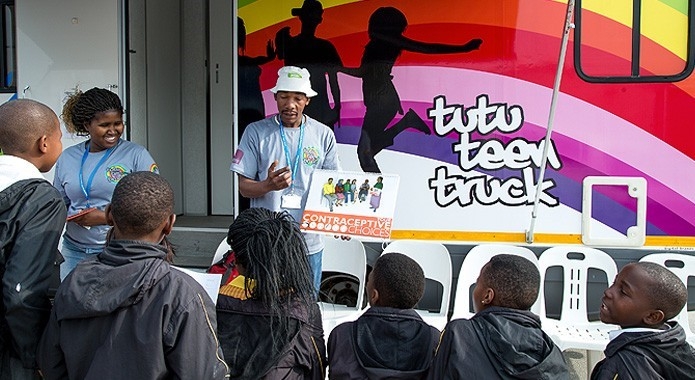Bringing “Health on Wheels” to At-risk Teens in Cape Town

This article was written by Philip Smith, Programme Manager at Desmond Tutu HIV Foundation
UNAIDS’ goal for HIV eradication calls for 90% of people living with HIV to know their status, 90% of HIV-positive people to receive treatment, and 90% of those on treatment to have suppressed viral load – all by 2020. In South Africa, testing and treating teens is critical for meeting these goals.
HIV prevalence among South Africans teens is higher than in any other adolescent population in the world. What’s more, like all HIV-infected people, teens with HIV often have high rates of co-infection with tuberculosis (TB). For healthcare providers, though, screening teens presents significant challenges. It can be difficult for teens to access traditional healthcare providers and clinics. Other issues, such as the need for anonymity when accessing sexual health services and the stigma around HIV, can also be barriers to testing.

Under the patronage of Archbishop Emeritus Desmond Tutu, the Desmond Tutu HIV Foundation (DTHF) partnered with Alere in 2015, to expand the Foundation’s Tutu Teen Truck project, which brings rapid, on-site testing and referral to care for HIV, TB, sexually transmitted infections (STIs), reproductive health and common chronic diseases, to teens in high disease burden communities in the Cape Town metropolitan area.
As Linda-Gail Bekker, Chief Operating Officer of the Desmond Tutu HIV Foundation, said, “Youth and other key populations have been telling us for years that they find it difficult to access health services in our traditional health facilities. If we are really serious about making a difference to adolescent and youth rates of TB, STI, HIV and unwanted teenage pregnancy, then we are going to have to think outside of the box. The Tutu Teen Truck, which is ‘health on wheels,’ is our response to this problem.”
Transforming testing into a non-threatening and friendly community activity helps normalize and contextualize HIV.
The Foundation’s new self-sufficient mobile healthcare unit is fully equipped with point-of-care testing platforms, counseling and dispensing rooms, and staffed by a team of healthcare providers led by a nurse practitioner.
Beyond making healthcare services more accessible, the Tutu Teen Truck project also aims to reduce the stigma around HIV testing, which can keep youth from getting tested and, consequently, allow HIV infection to spread. Transforming testing into a non-threatening and friendly community activity helps normalize and contextualize HIV. This is becoming more important all the time, as HIV testing has become the gateway to overall primary healthcare engagement. By facilitating interactions with teens in more comfortable, natural settings, and with services that are clearly designed for them, we can help change the dialogue around well-being and encourage teens to take greater responsibility for their health, and the health of their communities, as they move into adulthood.
Results have demonstrated the effectiveness of this approach. In the two years since its launch, the Tutu Teen Truck has seen more than 8,000 teens and young adults, which is unprecedented when compared with traditional clinics. Overall, 98% of clients were tested for HIV, and approximately 40% completed their first HIV test ever, with an HIV prevalence of 3.4%.
Looking ahead, we are evaluating new ways to reach and engage teens, such as a mobile app. We are also committed to supporting ways to improve the technology and science needed to reach more adolescents while they are still healthy, as well as optimally assisting those who have been exposed to HIV, STIs, unwanted pregnancies or other health issues.
Alere’s partnership with the Desmond Tutu HIV Foundation has shown what a meaningful impact point-of-care testing can make outside of traditional healthcare settings by bringing potentially life-saving screening to young people who may otherwise never access it.
Join us at the 3rd Annual Aid & Development Summit Africa to discuss the latest health and WASH innovations.
If you’d like to stay informed on the latest updates in aid and development, please sign up for the AIDF newsletter.















